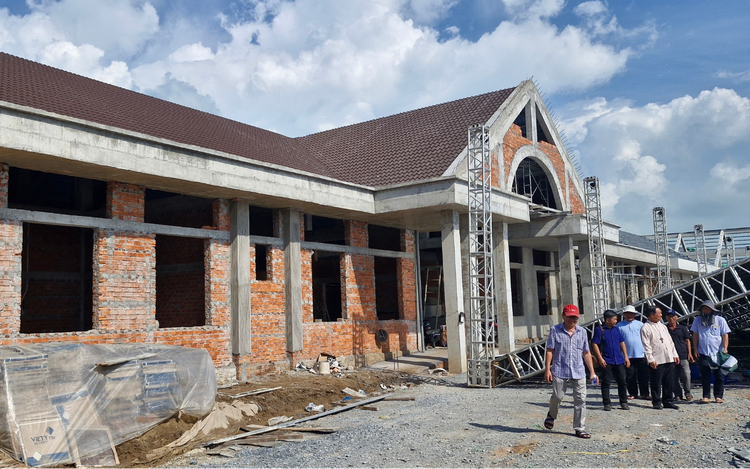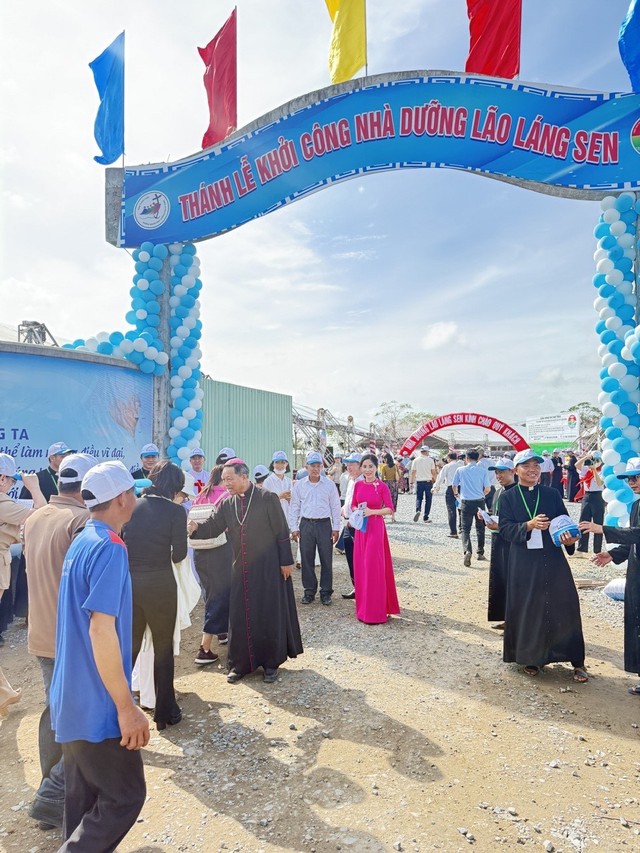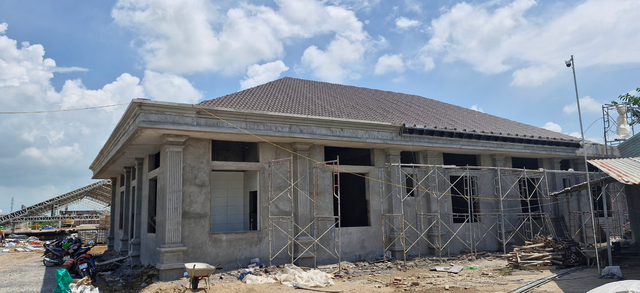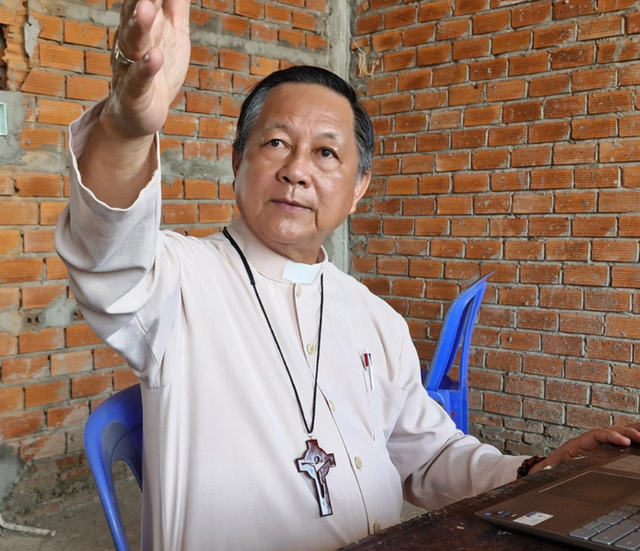
Lang Sen Nursing Home is under construction in Can Tho City, southern Vietnam. Photo: Le Dan / Tuoi Tre
The state-of-the-art complex, built at a cost of hundreds of billions of Vietnamese dong promises to provide free care, accommodation, and medical treatment for nearly 300 elderly individuals, regardless of ethnicity, religion, or gender.

The groundbreaking ceremony of Lang Sen Nursing Home in Can Tho City, southern Vietnam. Photo: Tran Tam
Place of rest that feels like a resort
Spanning 4.2 hectares along National Highway 80, Lang Sen Nursing Home is built by the Diocese of Long Xuyen and jointly managed by the Camillian Order.
The facility features various key zones tailored to the varying needs of its residents such as wings for the healthy elderly, those with declining physical functions, bedridden individuals, rehabilitation services, and even dedicated areas for palliative care and a funeral home.
Despite being a charitable institution, Lang Sen is architecturally modern and meticulously constructed, rivaling upscale wellness retreats.
Each room is equipped with full amenities, including in-built air conditioning, spacious layouts, and accessibility features.
Also, the facility boasts a 5,000-square-meter eco-zone with a fish pond, vegetable gardens, fruit orchards and rice paddies, allowing the elderly to reconnect with nature and find peace in daily routines.
In addition, there is a designated work area to help generate income, where healthier residents receive job training.
“The elderly can make mats for visitors to buy in support. This way, they not only earn some extra income but also stay mentally and physically active,” shared Bishop Joseph Tran Van Toan of the Diocese of Long Xuyen.
Slated to open in early 2026, Lang Sen Nursing Home aims to provide free lifelong care for some 300 elderly people, regardless of ethnicity, religion, or gender.

Lang Sen Nursing Home is set to provide free care, accommodation, and medical treatment for nearly 300 elderly individuals. Photo: Le Dan / Tuoi Tre
Spreading the spirit of filial piety
The home will require about 80 staff members to operate at full capacity.
Currently, 50 caregivers have already undergone training, with a focus not only on medical and geriatric care but also on empathetic, familial engagement.
“They are trained to provide care with the compassion and respect of a child for a parent or a grandchild for a grandparent,” Bishop Joseph Toan said.
Support will also come from within the diocese itself, which includes priests and seminarians who are also qualified doctors.
Volunteer medical groups, including Catholic and interfaith practitioners, have pledged to take rotating shifts to provide specialized care once the facility is fully operational, Bishop Joseph Toan shared.
The Lang Sen project aspires to foster a culture of filial piety, charity, and community responsibility across generations.
Children will be encouraged to visit, help clean, and play with the residents, while adults may assist with heavier work in the gardens or the fishpond, creating an intergenerational dynamic that benefits everyone involved.
Workshops and outreach programs will be hosted at the facility to promote the traditional Vietnamese value of ‘kinh lao dac tho’ (Respect the aged, gain longevity).
Visitors, including students, teachers, and religious leaders, will be shown short films and participate in discussions to deepen their understanding of aging and community care.
Commenting on the significance of the project, Doan Viet Duc, chairman of the People’s Committee of Vinh Thanh Commune, stated that Lang Sen Nursing Home is primarily dedicated to caring for elderly people living alone, including those with severe illnesses and no family support, regardless of ethnicity, gender, or religion.
He described it as a profoundly humanitarian initiative.
Local authorities have helped facilitate the project by giving permission for the conversion of the land use purpose and granting a construction license to ensure the project can run smoothly.
“In the coming time, along with the existing support policies for the lonely elderly, the local authorities will continue calling on philanthropists to contribute and help sustain the operations of Lang Sen Nursing Home in the best possible way,” Duc said.

Bishop Joseph Tran Van Toan. Photo: Le Dan / Tuoi Tre
Bishop Joseph Tran Van Toan to reside in Lang Sen Nursing Home
The monthly cost of care for one resident at the nursing home is estimated at VND5 million (US$190), or about VND1.5 billion ($57,230,000) per month for all 300 residents, equivalent to VND18 billion ($686,720) annually.
According to Bishop Joseph Toan, funding for the construction and operation of the nursing home is sourced through contributions from individuals and organizations across the country.
The contributors also include Catholics and followers of other religions.
“Vietnamese people have a deep sense of compassion, so we hope the community will continue to support this charitable mission.
“After we issued an open letter, many individuals began sending donations to the diocese’s account to contribute,” Bishop Toan said.
“Some donated VND1-2 million ($38-76), while others contributed up to VND100 million ($3,810).
“In the near future, I will also encourage priests to promote the spirit of charity among children. They will save money in piggy banks so that during holidays or the Lunar New Year celebration, they can give lucky money to the elderly,” Bishop Joseph Toan said with a cheerful smile.
“In the next five years, when I retire, I will apply to live in this nursing home and enjoy my old age with the other residents,” he added.


Max: 1500 characters
There are no comments yet. Be the first to comment.